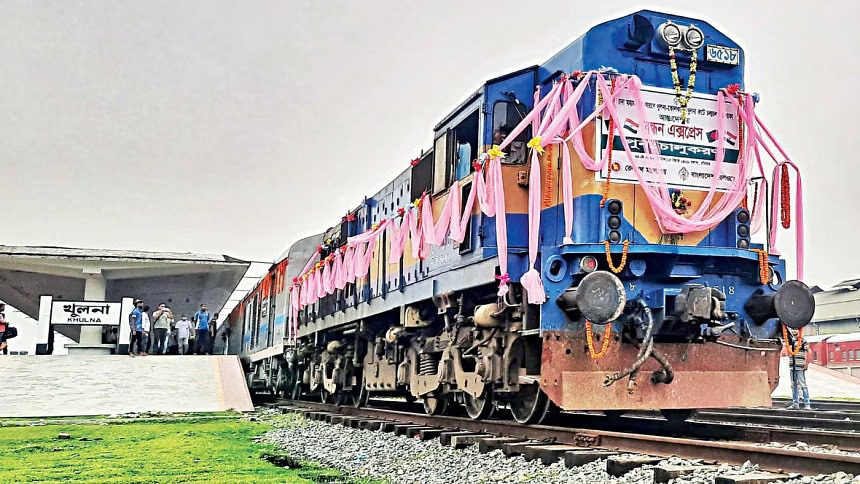Passenger train services between Bangladesh and India are unlikely to resume anytime soon, as security concerns and strained diplomatic relations continue to hinder operations, officials say.
The suspension, which followed last year’s violent uprising that led to the ousting of former prime minister Sheikh Hasina, remains in place, with India hesitant to approve the resumption of services.
Anti-India sentiment has grown in Bangladesh since New Delhi granted shelter to Hasina after she fled the country during the July-August mass uprising.
At least three officials from the ministries of railway and foreign affairs confirmed that India has cited security risks in Bangladesh as a major obstacle to resuming train operations.
The Indian side views the current political situation under the interim administration led by Muhammad Yunus as unfavorable for the safe operation of passenger trains.
During a recent intergovernmental railway meeting in New Delhi, attended by senior officials from both countries, Indian representatives raised concerns about security risks and indicated that services would only resume after an elected government takes office in Bangladesh.
“Getting a green light from India for train operations will be difficult at this time,” said an official who requested anonymity.
The meeting followed an agenda set by India, discussing issues such as passenger and freight train operations, railway connectivity, ongoing projects, and technical concerns. However, the resumption of passenger trains was a focal point of the discussions.
India, which has suspended most categories of visas for Bangladeshi citizens, insists that the visa process must be streamlined before passenger train services can restart.
Without an accessible visa process, officials argue, there will not be enough passengers to sustain the operations. Since visa regulations fall under the central government’s jurisdiction, the Indian Railway Board has remained silent on the matter.
Political and diplomatic tensions between the two nations further complicate the issue, making it unlikely that train services will resume before the upcoming elections, according to an official from Bangladesh’s Railway Division.
Bangladesh has made multiple requests to India for the resumption of train services. However, citing central government decisions, the Indian Railway Board has yet to approve any proposal.
Bangladesh Railway later engaged the Ministry of Foreign Affairs to communicate with the Indian government, even sending official letters via the Indian High Commission in Dhaka, but no positive response has been received.
On July 18, 2024, Bangladesh suspended all train operations within the country after protesters attacked trains and blocked railway tracks as part of the anti-government actions.
Cross-border passenger train services between Bangladesh and India were halted on the same day. Freight train services were also suspended on July 25.
After Hasina’s departure on August 5, the situation in Bangladesh slightly stabilized, allowing domestic train services to resume on August 12.
However, cross-border rail connectivity remains suspended and India only agreed to resume freight train operations on August 19, following a formal request from the Bangladeshi government.
According to sources from Bangladesh’s Ministry of Railway, separate communications have been held with the Indian Railway Board.
While Indian officials have expressed interest in resuming train services, they have stated that approval from their central government is required before proceeding further.
“Since they have not yet received such approval, they cannot take any action,” said an official from the ministry.
“We are fully prepared on our end. However, as this is an inter-country train service, the consent of both governments is required. High-level government decisions are crucial in this matter. At this point, the railway authorities have no control over the situation,” said Bangladesh Railway’s Director General, Md. Afzal Hossain, in an interview with Times of Bangladesh.
A senior official from the South Asia wing of the Ministry of Foreign Affairs said that Dhaka has been in close contact with New Delhi on multiple bilateral issues, including the resumption of train connectivity.
“India’s primary concern is security risks. Without approval from their central government, the Indian railway authorities cannot make a decision,” the official added.
A senior railway official, speaking on condition of anonymity, said: “We made multiple attempts to resume freight train services and succeeded. However, when it comes to operations of passenger trains, the Indian railway authorities remain silent, waiting for the government instructions.”
The Maitree Express, Bandhan Express, and Mitali Express are three fully air-conditioned passenger train services operating between India and Bangladesh.
The Maitree Express, which connects Dhaka and Kolkata, was the first train to resume services between the two nations in April 2008. Rail connectivity between the two neighbors dates back to British colonial rule but was disrupted after the partition of India and Pakistan in 1947 when Bangladesh was part of Pakistan).
While services resumed for a period, they were again suspended during the 1965 India-Pakistan war.
During last year’s political unrest, the Mitali Express arrived at Dhaka Cantonment Station from New Jalpaiguri on July 17.
It was scheduled to depart for New Jalpaiguri the following night but remained grounded due to the deteriorating situation. The train was stranded at Dhaka Railway Station for several months before being returned to India empty, under maximum security arrangements, at New Delhi’s request.
The Maitree Express continued to serve the Dhaka-Kolkata route, while the Bandhan Express linked Khulna to Kolkata. All these trains utilize rakes owned by India, which are currently stationed there as services remain suspended.


